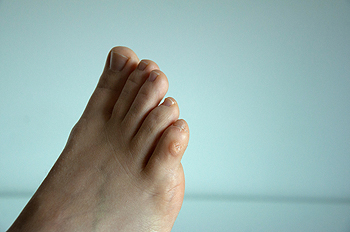Dealing With Corns on the Feet

Corns on the feet are often triggered by chronic pressure or friction. They arise from factors like wearing poorly fitting shoes or foot deformities, and can lead to discomfort and inflammation. A corn is a lesion with a central conical core of keratin. There are two subtypes of corns, which are hard and soft corns. The hard corn, the most common type, appears as a dry, horny mass with a hard central core, often found on the side of the pinky toe or on the joints of the lesser toes. On the other hand, the soft corn results from excessive moisture absorption, presenting as a macerated lesion that commonly develops between the fourth and fifth toes. Both hard and soft corns are frequently associated with a hammertoe deformity. Treatment approaches vary, with conservative measures like cushioned pads being effective for young individuals with a fixed deformity. Surgical correction may be considered for nonresponsive cases, especially in older patients with fixed deformities. If persistent discomfort is experienced from corns, it is suggested that you schedule an appointment with a chiropodist for personalized guidance and effective management.
Corns are small bumps or dry, hardened skin that can arise on the feet, usually in response to friction. Corns can be asymptomatic, or they can be uncomfortable or painful. If you have corns that are bothering you, please consult with one of the specialists from Thornhill Foot Clinic. Our chiropodists can help you maintain the health of your lower limbs and your mobility.
There are three types of corns:
Hard corns
Often occur on the tops of toes
Feature a hard core surrounded by dry, irritated skin
Can be painful
Soft corns
Often occur in between the toes
Soft due to constant exposure to sweat
Can be painful
Seed corns
Tiny
Often occur on the soles of the feet
Usually asymptomatic
Corns can be prevented by wearing shoes that fit properly. They are typically benign and don’t require medical treatment. However, if your corns are causing you pain or discomfort, don’t hesitate to reach out to a chiropodist near you for treatment options. If you have any questions, please feel free to contact our office located in . We offer the newest diagnostic and treatment technologies for all your foot care needs.
